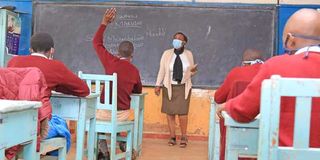Premium
BBI goes for multi-ethnic schools

A teacher takes her pupils through their lessons at Temple Road Primary School in Nyeri town on Monday.
What you need to know:
- Stakeholders further suggested programmes for cultural exchange and integration in schools so that learners can appreciate the different cultures.
- The BBI report also recommends revision of the school curriculum to include compulsory material on cultural diversity.
The Building Bridges Initiative (BBI) has recommended an admissions criteria to ensure that at least half of students in public boarding secondary schools are drawn from different counties.
It seeks to ensure regional balance in admissions by discouraging skewed enrolment of students from the dominant community in the school’s locality.
And the report requires that the same applies to teachers, which would occasion contentious transfers — the Teachers Service Commission’s delocalisation policy infuriated unions —or compliance in subsequent recruitment.
These are among proposals the BBI report wants implemented through administrative action, which means the government is only required to give policy direction.
The report asks the Ministry of Education to develop a policy to guide implementation of this requirement.
According to the BBI task force, Kenyans during validation of the report cited ethnic antagonism as a major threat to the nation’s success. They recommended a review of education policies to promote social integration, citing admission to schools and institutions of higher learning.
“The ministry should adopt policy guidelines that discourage local recruitment and staffing of teachers, depending on the circumstances,” the report says.
Stakeholders further suggested programmes for cultural exchange and integration in schools so that learners can appreciate the different cultures.
The BBI report also recommends revision of the school curriculum to include compulsory material on cultural diversity.
Curriculum development
It tasks the Education ministry, the Kenya Institute of Curriculum Development (KICD), ECD and TSC in consultation with stakeholders such as Parents Teachers Associations, the Private Schools Alliance and churches to work out delivery of the subject. It further wants teachers to undergo training “to reorient them to this new programme.”
Another proposal is the revision of the curriculum to include the history of all the ethnic communities and innovations passed down to generations.
The report asks the National Treasury to budget for and Parliament to allocate funds for the implementation of the programme.
It also proposes inclusion of conflict resolution, negotiation and counselling skills in the curriculum at all levels of primary and secondary education.
The Education ministry and KICD are directed to ensure curriculum development and teaching in schools of these subjects.
And to ensure government invests in public institutions like schools and hospitals, the BBI report recommends an executive order to develop a ministerial code that requires ministers to use public institutions.
The report proposes the promotion of cultural centres in every county. It urges Parliament to allocate funds through the National Treasury in conjunction with the Commission on Revenue Allocation (CRA) for improvement of existing centres and development of centres in every county.





